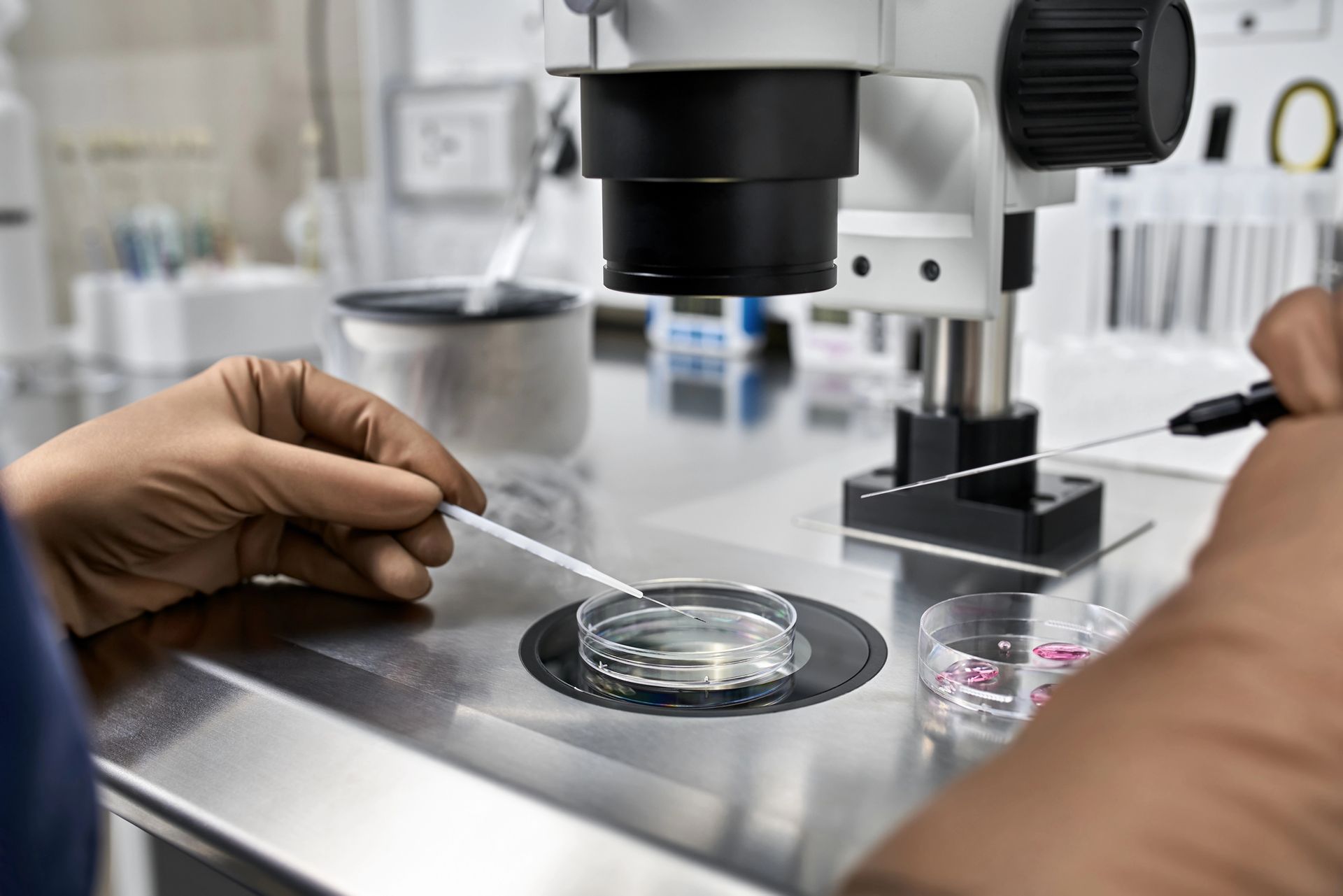
Freezing Eggs - Science Helping to Build Families
The concept of being able to successfully freeze and subsequently thaw the unfertilized human egg (oocyte) has revolutionized the field of Reproductive Medicine. Previously less successful slow-freeze techniques have been essentially replaced by the rapid-freeze techniques, with close to 100% viability rates, and pregnancy rates comparable to embryo freeze and fresh cycles. This advance in technology has extended the possibilities for use of this process, and has helped empower women and couples to have an additional option to accomplish their dream of building a family.
The Benefits of Egg Freezing
Can Focus on Your Career
In recent years, many women have been choosing to focus on their careers or education before starting a family. Egg freezing offers these women the ability to pursue their goals while also preserving their future fertility options.
Preserve Your Health & Well-Being
Certain medical conditions or treatments, such as chemotherapy, can potentially impact fertility. By opting to preserve eggs beforehand, individuals can increase their chances of conceiving in the future.
Wait for the "Right One"
For women who have not found a suitable partner yet, egg freezing is an option to preserve their fertility for future family planning whenever they are ready.
Provides a "Safety Net" for the Future
Freezing eggs can be a proactive choice for women with a family history of early menopause or other fertility-related conditions. This option allows them to safeguard their reproductive potential for the future.
Success Rates for Egg Freezing
Hudson Valley Fertility is a renowned destination for egg freezing in the Fishkill, NY and Hudson Valley, NY regions. Our fertility clinic boasts a notable success rate in both egg freezing and thawing procedures, made possible through the implementation of advanced techniques such as egg vitrification, and the expertise of our skilled team of fertility specialists, embryologists, and nursing staff. While success rates can vary based on individual factors such as age and egg quality, our specialists are dedicated to providing personalized support and guidance to enhance your chances of success, ensuring you receive exceptional care every step of the way.
How Egg Freezing Works
Initial Consultation
Our team of fertility experts carefully examines your medical background, explores your objectives, and assesses whether egg freezing is the ideal option for you.
Ovarian Stimulation
You will receive hormone injections to encourage the development and maturation of several eggs in your ovaries. This process usually lasts 10-12 days and will be closely monitored with blood tests and ultrasounds.
Egg Retrieval
With gentle sedation, a proficient Hudson Valley Fertility specialist retrieves mature eggs through a minimally invasive, ultrasound-guided procedure.
Cryopreservation
Our skilled fertility specialists meticulously freeze and store your eggs in our cutting-edge laboratory through the vitrification process, guaranteeing top-notch preservation.
Storage
We will freeze your eggs with liquid nitrogen and store them safely in our facility until you are ready to utilize them for conception.
Is Egg Freezing Right For You?
Egg freezing is most effectively considered during a woman's optimal reproductive age, typically before reaching the age of 35. During this phase, both the quality and quantity of eggs are typically at their peak, increasing the chances of successful preservation and potential future conception. However, women over the age of 35 should still explore this option, as positive outcomes can be achievable depending on individual factors. Consulting with a fertility specialist can help determine the best timing for egg freezing based on the unique circumstances of each individual.
Step 1: Fertility Evaluation
One of the first steps before considering egg freezing is a fertility evaluation. This evaluation provides important insights into your current fertility status and serves as the initial stage of the process. It includes a comprehensive assessment of your reproductive health, including measurements of hormone levels through blood tests, evaluations of your ovaries and uterus via ultrasounds, and a review of your medical history and family medical background. These examinations offer valuable information about your fertility health and can help guide decisions related to egg freezing and other options for preserving fertility.
Step 2: Engage in a Discussion with a Fertility Specialist
Making the thoughtful choice to explore egg freezing necessitates engaging in a dialogue with a skilled fertility specialist. This crucial conversation allows for an evaluation of the results of your fertility assessment, a comprehensive explanation of the egg-freezing process, and the opportunity to address any questions or concerns you might have. The specialist will work collaboratively with you to devise a personalized treatment plan that takes into account your unique needs and goals, ensuring that you are well-informed and decisive about proceeding with egg freezing.
Step 3: Harvesting and Preservation of Eggs
After undergoing a thorough fertility assessment and consultations with a fertility specialist, you will be able to consider whether egg freezing is the most suitable choice for you. If you decide to move forward with the process, a team of fertility experts will guide you through each step, from ovarian stimulation to egg retrieval, and the subsequent freezing and preservation of your eggs. Taking a proactive approach to preserving your fertility can help secure your ability to conceive in the future and expand your options for family planning, giving you the flexibility to start a family on your own terms.
Common Questions
Indications for Egg Freezing
1. Fertility Preservation Prior To Cancer Therapy
One of the most critical indications for egg freezing is the ability to offer preservation of fertility for women facing chemotherapy as part of their cancer treatments. These treatments can lead to permanent loss of reproductive potential for women due destruction of their eggs as a direct result of the chemotherapy, with premature ovarian failure and early menopause. The older the woman is at the time of chemotherapy, the higher the likelihood that permanent ovarian failure will occur as a result of the chemotherapy. Even with a diagnosis of cancer, fertility preservation with egg freezing can be safely performed in many cases prior to chemotherapy, in order to ensure future fertility potential. Reproductive Endocrinologists work closely with medical and GYN oncologists to ensure the treatments are safe and tailored to the persons’ needs.
2. Elective Egg Freezing
Increasingly, women are opting to pursue egg freezing due to career and life plans. Given the fact that women are born with all the eggs they will have in their lifetime, with a progressive loss of reproductive function in the late 30’s and 40’s, the ability to freeze one’s eggs earlier in life becomes an attractive possibility to ensure future fertility. The eggs frozen earlier in ones’ reproductive life are of higher quality, with enhanced success to achieve successful pregnancy, with less miscarriage and genetic risks. The increased success of egg freezing, along with improved strategies to help reduce cost, has made egg freezing more widely accessible to women seeking this medical treatment.
3. Egg Freezing as part of Assisted Reproductive Technology (ART) Treatments
ART, which encompasses IVF and related treatments, is increasingly using egg freezing as part of our protocols. In the event that no sperm is available on the day of an IVF procedure, the couple can elect to freeze eggs, with excellent expectation that future fertilization and successful pregnancy can be accomplished when any sperm issue has been resolved. From a religious/ethical perspective, many couples have strong personal beliefs regarding the freezing of embryos, and request freezing for eggs that are not immediately fertilized. In certain circumstances, even in a relationship, a woman for personal reasons might opt to request egg freezing for a portion of eggs obtained through an IVF cycle.
4. Donor Egg/Egg Bank
The use of egg donors for IVF has helped thousands of women achieve successful pregnancy when age-related decline, or other medical conditions, has not allowed success with treatment with their own eggs. Egg donor cycles have been traditionally performed with anonymous or known donors, who would undergo an IVF cycle with subsequent fertilization of the eggs with husband, partner or donor sperm. These fertilized eggs, or embryos, would be transferred to the recipient woman to achieve pregnancy. These cycles have involved significant cost and often limited access based on donor availability. The advent of improved egg freezing has allowed the development of frozen egg banks. Practices and labs throughout the country are establishing these banks of unfertilized frozen eggs, which offer the opportunity for enhanced access to donor eggs for more individuals and couples. With the growth of these banks, it is anticipated that costs will also be improved as this technology becomes more widely available.
Egg freezing represents an exciting advance in science, with a direct effect on the lives of human beings. This science has become an important part of treatment possibilities in reproductive medicine. As science and technology advance, it is anticipated that improved treatments, with less cost and more access, will help fulfill the dreams for all women and men who want to have a child and build a family.

